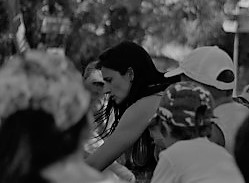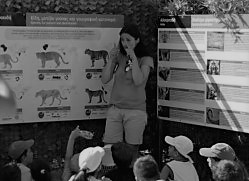Network Stories: Georgina Spyres
Describe your organization and the unique work that it is doing. Who and what are affected by the work? How does/will the work impact people’s lives?
I currently work at the Education Center of the Attica Zoological Park, which is accredited by the European Association of Zoos and Aquaria (EAZA). The Attica Zoological park falls within the 20% of the sites accredited by EAZA which meet the strict criteria set for animal welfare, conservation, education and research. Both individually and through the network of reputable zoos we aim to educate and influence the hearts, minds, and behaviours of the people we come into contact with, in order to promote sustainable lifestyles for the protection of our natural world, especially its biological richness. The thousands of students that we come into contact with every year attest to feeling awe and excitement at encountering amazing wildlife up close, which is a first step toward pro-environmental behaviour. Our hands-on interactive and engaging educational programs and events shape the impressionable minds of our many young visitors toward compassion for our fellow beings and provide them with easy, small but impactful lifestyle changes, like using metal bottles for water and pasta straws instead of plastic. Evaluations of our work have shown that we consistently influence our target audience positively towards wildlife through transferring our knowledge. The open-space natural grounds of this zoological park are ideal for families of all ages to comfortably spend time connecting with nature be it picnicking under the trees, listening to the birds, or quietly observing the animals such as the family antics of the threatened Ring-tailed Lemurs. Our planetary health is directly connected to sustainable lifestyles and ultimately that is my job, to promote sustainability.
Tell us about a project that has benefited from the training you received from us? Why was the project important? Was there anything unusual or surprising about the execution of this project?
The Strategic Communications Planning workshop run by The Heritage Management Organization taught me good practices in employing social media and press for messaging. I have applied the principles widely across my projects in conservation education and promotion of our work, including improved planning of all my personal communication for networking. Furthermore, the workshop enabled me to combine the skills attained with some effective environmental education techniques in order to design a short and simple workshop for students aged 12-18 years’ old that are interested in campaigning for a chosen environmental cause. Our Youth Service Learning Program, which engages such students in nature and wildlife topics on an annual basis, is STEM heavy and focused on using nature’s solutions to problems, such as conserving resources and energy, reducing pollution, protecting habitats and improving animal welfare.
There is also a good percentage of students that come to us, the program mentors, looking for direct short-term action on raising awareness and fundraising. They want to make a difference today – right now. One student is currently designing a communications project so that people purchase only sustainable certified palm oil, to protect habitats of tropical animals such as the orangutan, the Asian elephant, and the tiger. The Heritage workshop enabled us to immediately reach a wider audience. My training with The Heritage Management Organization has helped me to empower the students with improved communication skills.
Has your organisation worked on any other projects that are innovative, globally significant and can be replicated in a local market?
We are at the early stages of a partnership on a program regarding wildlife on Parnitha Mountain, the closest national protected forest to Athens. We are communicating with wildlife biologists about Parnitha’s biodiversity becoming richer in the last few decades with more predators appearing and with stakeholders about the respectful and increased use of the mountain by the public. Our goal is to strategically communicate certain key messages, such that biodiversity is respected and protected by all and that the public becomes more involved in wilderness awareness and outdoor events to connect with nature and promote pro-environmental behavior. Once again, the Strategic Communications Planning workshop by The Heritage Management Organization provided very important insight on tackling some key issues when it comes to dialogue with an audience and pathways to achieve our goals. We really must first understand people, engage with them with meaningful conversation and help them resolve toward behaviors that ultimately benefit everyone. This approach is of utmost priority for conservation on a global scale.
What are the global issues that your project addresses (e.g., fighting climate change, preserving heritage and culture, promoting local participation)?
My projects all address the conservation of our natural heritage, which means conserving species of flora and fauna within whole ecosystems as we unfortunately face a sixth mass extinction. I am also a core partner in a climate education school program (https:// CarbonBustersClub.org) which aims to curb over-consumption fuelling climate change. To manage this planetary crisis, we need a complex approach, chaotic as such. Solutions need to be well-evaluated but they must come from all levels of humanity and from all disciplines. Essentially the core functioning of our current society needs to be re-wired.
The ultimate solution to any disconnect with the natural world, in my opinion, boils down to three things;
- “nature connection” or spending more time in nature as priority.
- “love, not loss” or focusing on the beauty of our world as inspiration rather than the destruction by humans and quite importantly.
- “environmental education” embedded through whole national curricula and core subjects, something necessary for understanding and managing our future.
The subject of environmental education is widely treated in our country by both educators and parents, as a free school hour to cover other seemingly more important topics. It makes sense that non-formal environmental education platforms, especially in Greece, can provide the whole family with the opportunities for the above activities. Myself, my colleagues our collaborators and partners, are wholly dedicated to inspiring and instilling awe, knowledge and respect for wildlife. This is our core common mission, to motivate everyone to protect our planet’s natural heritage, currently undergoing serious crisis due to habitat loss and degradation by human activities, including the massive repercussions from climate change events.


